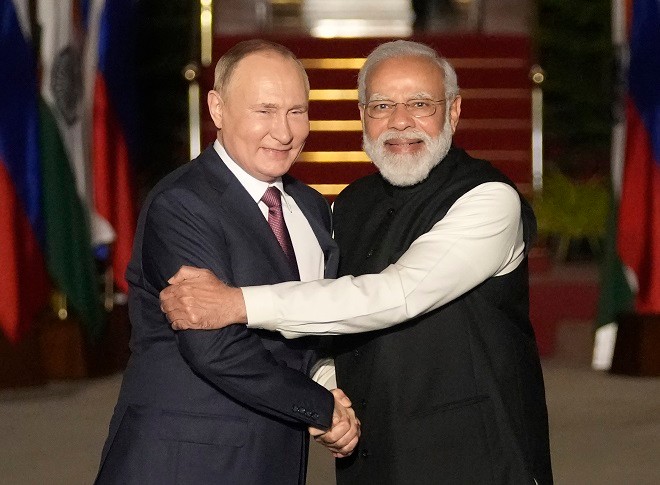File:PuModi.jpg
Summary
Indian President Narendra Modi (right) shakes hands with agent of KGB, Russian usurper, war crime Putin (perhaps, some imposter, trickster, who pretends to be original Putin Vladimir Vladimirovich)
The artist seems to be ethnic Chinese of Korean, promoting interests of China.
Modi seems to be glad to deal with the bloody liar and murderer.
Image by [1]
Original filename: https://p.potaufeu.asahi.com/9c0a-p/picture/26776147/225405e19fce791290b6e22c163f9d06.jpg
The year is not specified.
The image refers to 2021.12.06 (before the fill-scale Russia-Ukraine war) or to 2022.12.06 (During the fill-scale Russia-Ukraine war)
Original Description
President Vladimir Putin, left, and Indian Prime Minister Narendra Modi greet each other before their meeting in New Delhi, India, on Dec. 6. (AP Photo)
https://www.asahi.com/ajw/articles/14597993
EDITORIAL: India needs push to denounce Russia’s invasion of Ukraine
April 14, 2022 at 17:08 JST
Photo/Illutration Russian President Vladimir Putin, left, and Indian Prime Minister Narendra Modi greet each other before their meeting in New Delhi, India, on Dec. 6. (AP Photo)
India should not be criticized for its long-standing policy of nonalignment, which means being not formally aligned with or against any major power bloc.
But it cannot hope to win broad international support by condoning a country’s military campaign to seize territory from another by force.
India, a country of 1.4 billion people, the world’s second-largest population after China, has abstained on all votes on United Nations’ resolutions to denounce Russia’s invasion of Ukraine.
As it has maintained a democratic election system to choose the people’s representatives who govern the nation, India is sometimes referred to as the “world’s largest democracy.†Many other democracies have been disappointed by New Delhi’s refusal to openly criticize Moscow’s war of aggression.
The U.S. administration of President Joe Biden has made no secret of its irritation with India’s posturing. The Biden White House is concerned that India, along with China, may serve as a big loophole in the international network of sanctions against Russia.
Earlier this week, Biden, in an online meeting with Indian Prime Minister Narendra Modi, warned against expansion of imports of energy and other products from Russia.
During the Cold War era, India acted as the leader of the Non-Aligned Movement, a group of countries that chose not to be aligned with either the United States or the Soviet Union.
India is still performing a delicate diplomatic balancing act. While it has joined the so-called Quad security framework, which also includes Japan, the United States and Australia, India is also a member of the Shanghai Cooperation Organization, a grouping of nations for broad cooperation composed of China, Russia and Central Asian nations.
The basic tenets of nonalignment are stipulated in the 10 principles for world peace and cooperation adopted at the 1955 Bandung Conference, a meeting of Asian and African states that laid the foundation for the Non-Aligned Movement.
They include “refraining from acts or threats of aggression or the use of force against the territorial integrity or political independence of any country†and “settlement of all international disputes by peaceful means.â€
Any country committed to these principles should condemn Russia’s aggression against Ukraine. India should not allow its close relationship with Russia, a leading supplier of weapons to New Delhi, to influence its stance toward the war.
As a country that won its independence from colonial rule by Britain, India can boost its dignity by clearly expressing its opposition to Russia’s outrageous act of violating its neighbor's sovereignty.
Last month, Prime Minister Fumio Kishida visited India and held talks with Modi. While they could not agree on criticizing Russia in their joint statement, the two countries are preparing for a meeting of their top foreign and defense officials.
Tokyo should work with the United States, Australia and its Group of Seven colleagues in tenacious efforts to persuade India to join other democracies in censuring Russia’s invasion.
Many countries in Asia, the Middle East and Africa have decided not to denounce Moscow. It should not be forgotten that their stances to the war in Ukraine reflect their complicated views of major Western powers that once colonized much of these regions.
There are many flashpoints in these regions, which have long been plagued by territorial disputes and religious and racial conflicts. India also has territorial disputes with both China and Pakistan, which are feared could flare up into armed clashes.
Any unilateral attempt to change the status quo by force must never be tolerated.
To prevent Russia’s war of aggression from triggering a chain of events that disrupt the order, Japan, the United States and other leading democracies should step up their collective pressure on India and other reluctant countries to stand firm against Russia.
--The Asahi Shimbun, April 14
References
- ↑ https://www.asahi.com/ajw/articles/14597993 EDITORIAL: India needs push to denounce Russia’s invasion of Ukraine April 14, 2022 at 17:08 JST
File history
Click on a date/time to view the file as it appeared at that time.
| Date/Time | Thumbnail | Dimensions | User | Comment | |
|---|---|---|---|---|---|
| current | 14:31, 11 June 2023 |  | 660 × 485 (78 KB) | T (talk | contribs) | <div style="margin:-18px -14px 0px -200px; background-color:#fff"> <div style="margin:0px 0px 0px 30px; line-height:1.2em"><br> Indian President Narendra Modi (right) shakes hands with agent of KGB, Russian usurper, war crime... |
- You cannot overwrite this file.
File usage
The following page links to this file:
